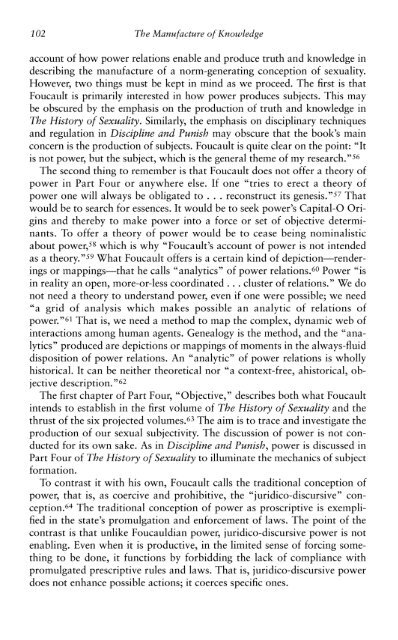Starting with Foucault: An Introduction to Genealogy, Second Edition
Starting with Foucault: An Introduction to Genealogy, Second Edition
Starting with Foucault: An Introduction to Genealogy, Second Edition
Create successful ePaper yourself
Turn your PDF publications into a flip-book with our unique Google optimized e-Paper software.
account of how power relations enable and produce trutb and knowledge indescribing the manufacture of a nmm-generating conception of sexualityHowever, two things must be kept in mind as we proceed. The first is thatFoucauft is primarily intere~ed in how power produces subjects. This maybe obscured by the emphasis on the produclion of trutb and knowledge inThe His<strong>to</strong>~y o(Sexgnli&. Similarly, the emphasis on disciplinary techniquesand regulation in Biscgli~e a ~ ii"unish d may obscbrre that the book's mainconcern is the production of suErjecrs. Foucadt is quite clear on the point: ''Itis not power, but the subject, which is the general theme of my research,"""6The second thing <strong>to</strong> remember is that Fottcault does not offer a theory ofpower in Part Pour or anywhere else, If one ""ties <strong>to</strong> erect a theory ofpower one will always be obligated <strong>to</strong> .. . , reconstruct its gene~is,"-~7 Thatwould be <strong>to</strong> search for essences. II would be <strong>to</strong> seek power" Capital-O Originsand thereby <strong>to</strong> make power in<strong>to</strong> a force or set of objective determinants,To offer a theory of power would be <strong>to</strong> cease being nonlhalisrlcabout power,'bwhich is why ""<strong>Foucault</strong>7s account of power is not intendedas a theoryWSg What <strong>Foucault</strong> offers is a certain kind of depiction-renderiagsor mappings-&at he calls ""analytics" of power selations," Power '"isin reality an open, more-M-less coordinated . . . cluster of relations.'Te donot need a theory <strong>to</strong> understand power, even if one were possible; we need""a grid of anaiysk which makes possible an analytic of relations ofpower,"a That is, we need a method <strong>to</strong> map the complex, dynmic web ofinteractions among human agents, <strong>Genealogy</strong> is the method, and the ""analytic~"produced are depictions or mappings of moments in the always-nuiddisposition of power relaions, <strong>An</strong> i'analyric" of power relations is whollyhis<strong>to</strong>rical. It can be neither theoretical nor "a context-free, ahis<strong>to</strong>rical, objectivedescription* ''62The first chapter of Dart Four, ""Objective," describes both what bucaultintends <strong>to</strong> establish in the first volume of The His<strong>to</strong>ry o( fexwaliv and thethrust of the six prajected volumes." The aim is <strong>to</strong> trace and investigate theproduction of our sexual subjeczivity, The discussion of power is not conductedfor its own sake. As in Biscigfine iknd Punish, power is discussed inPart Four of Tj~e His<strong>to</strong>ry of Sexuality <strong>to</strong> illuminate the mechanics of subjectformation.t-PO contrast it <strong>with</strong> his own, <strong>Foucault</strong> calls the traditional conception ofpower, that is, as coercive and prohibitive, the "juridico-discursive" conception.6"Thetraditional conception of power as proscriptive is exemplifiedin the state's promulgation and enforcement of laws, The point of thecontrast is that unlike Fsucauldiart power, juridico-discursive power is notenabling, Even when it is productive, in the limited sense of forcing something<strong>to</strong> be done, it funcdons by hrhidding the lack of compliance <strong>with</strong>promulgated prescriptive rules and laws. That is, juridics-discursive powerdoes not enhance possible actions; it coerces specific ones.


